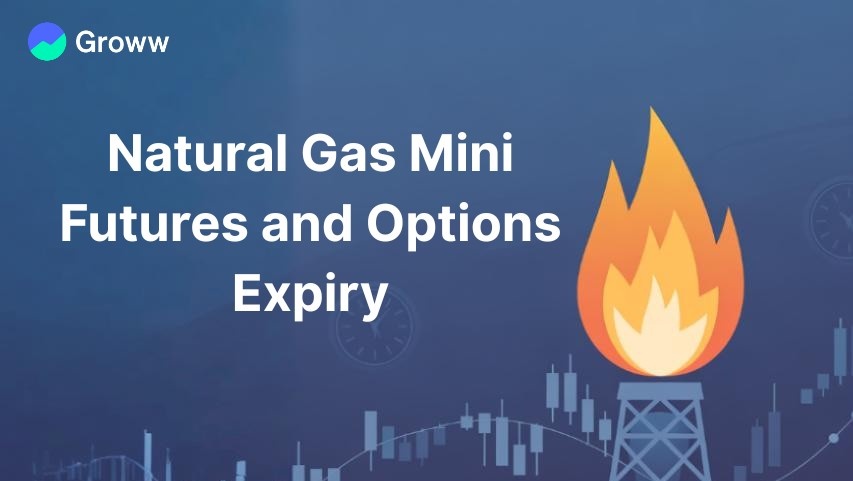Natural Gas Mini Futures & Options Expiry - 2025

Natural gas mini expiry refers to the specific date of expiry when the futures or options contract for the commodity will no longer be valid. It cannot be traded anymore from this date. Let us learn more about it below.
What is Natural Gas Mini Futures & Options Expiry?
Natural Gas Mini contracts are smaller-sized (250 mmBtu) and have lower entry barriers for traders, leading to higher participation in the market. They also come with lower margin requirements and higher flexibility than regular futures contracts on the MCX (Multi-Commodity Exchange of India). Futures contracts have a duration of at least 6 months, and the maximum order size is 60,000 MMBtu.
Options contracts shall derive their value from the underlying Natural Gas Mini Futures contract that is traded on the MCX. The contracts are available as per the Contract Launch Calendar. The expiry is two business days before the expiry day of the underlying futures contract, based on the MCX expiry rules.
Natural Gas Mini Futures Expiry 2025
Here is the list of the MCX natural gas mini futures expiry for 2025 -
|
Contract Month |
Contract Launch Date |
Contract Expiry Date |
|
January 2025 |
29 July 2024 |
28 January 2025 |
|
February 2025 |
28 August 2024 |
25 February 2025 |
|
March 2025 |
26 September 2024 |
26 March 2025 |
|
April 2025 |
29 October 2024 |
25 April 2025 |
|
May 2025 |
26 November 2024 |
27 May 2025 |
|
June 2025 |
27 December 2024 |
25 June 2025 |
|
July 2025 |
29 January 2025 |
28 July 2025 |
|
August 2025 |
26 February 2025 |
26 August 2025 |
|
September 2025 |
27 March 2025 |
25 September 2025 |
|
October 2025 |
28 April 2025 |
28 October 2025 |
|
November 2025 |
28 May 2025 |
24 November 2025 |
|
December 2025 |
26 June 2025 |
26 December 2025 |
Natural Gas Mini Options Expiry 2025
Here is the list of the MCX natural gas mini options expiry for 2025 -
|
Contract Month |
Launch Month |
Expiry Month |
|
January 2025 |
October 2024 |
January 2025 |
|
February 2025 |
November 2024 |
February 2025 |
|
March 2025 |
December 2024 |
March 2025 |
|
April 2025 |
January 2025 |
April 2025 |
|
May 2025 |
February 2025 |
May 2025 |
|
June 2025 |
March 2025 |
June 2025 |
|
July 2025 |
April 2025 |
July 2025 |
|
August 2025 |
May 2025 |
August 2025 |
|
September 2025 |
June 2025 |
September 2025 |
|
October 2025 |
July 2025 |
October 2025 |
|
November 2025 |
August 2025 |
November 2025 |
|
December 2025 |
September 2025 |
December 2025 |
Factors That Can Affect Natural Gas Mini Prices at Expiry
Natural gas mini expiry prices are affected by several factors, including the following:
-
Supply & Demand Equation
Storage capacity, production levels, and export/import volumes all impact supply levels. Higher supply usually leads to lower prices, while lower supply may also increase the prices in turn. At the same time, economic growth, alternative energy source availability, and weather conditions may also impact demand. Higher demand in the peak seasons may lead to an increase in prices, while lower demand may lead to a reduction in the same. -
Weather Conditions
Extreme temperatures increase demand for natural gas and may lead to higher prices. Severe weather conditions may also disrupt transportation and production, thereby leading to price volatility and affecting supply. -
Storage
Higher storage levels indicate an abundant supply and may lead to lower prices. At the same time, lower storage may indicate a potential shortage of supply and may drive prices upwards. -
Geopolitical Developments
Conflicts in gas-producing regions or political instability may disrupt supply chains and lead to spikes in prices. Sanctions on major producers can also have the same effect. -
Economic Aspects
Economic growth leads to higher energy demand and may lead to a hike in prices. Downturns and lower industrial activity may lead to a reduction in demand and prices, respectively. -
Crude Oil Prices
Natural gas prices are indirectly connected to crude oil rates. This is because they may influence each other as energy commodities via substitution or market sentiments.